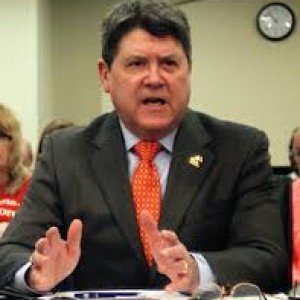By Jack Brammer
Kentucky Lantern
Veteran Kentucky lawmakers call it one of the most dramatic moments in the history of the state’s General Assembly. Memory of it has revived this spring as the nation — and Kentucky lawmakers — weigh a controversy over in vitro fertilization, a way to help infertile couples have a baby.
“What happened back in the state House in 1984 in that debate on in vitro fertilization in its early stages is a story worth telling again, especially now,” said Democrat Greg Stumbo of Prestonsburg.

“It certainly resonates today with all the talk on the topic.”
Stumbo was a rank-and-file legislator in that session 40 years ago before becoming majority floor leader, House speaker and attorney general.
The current debate over in vitro fertilization started last month in Alabama.
In a first-of-its-kind ruling Feb. 16, the Alabama Supreme Court ruled that frozen embryos are children and those who destroy them can be held liable for wrongful death.
Critics immediately said the ruling could have a chilling effect on infertility treatments like in vitro fertilization.
In vitro fertilization, also called IVF, is a complex series of medical procedures that can lead to a pregnancy. It’s a treatment for couples that cannot get pregnant after at least a year of trying. It also can be used to prevent passing on genetic problems to a child.
In the process, a woman’s egg is combined with male sperm in vitro (“in glass”) in a lab to produce a fertilized egg. One or more of the fertilized eggs, called embryos, are placed in a woman’s uterus, which is where babies develop.
The embryos can be stored in liquid nitrogen at minus 320 degrees Fahrenheit indefinitely.
The history of IVF goes back more than half a century. In 1959, the first birth in a nonhuman mammal — mice — occurred from IVF. In 1978, a woman in England gave birth after the first human IVF pregnancy. Since then, millions of babies have been born as a result of IVF.
Many state legislatures — including Kentucky’s — and the U.S. Congress have seen IVF legislation sprout up since the Alabama ruling. Alabama’s legislature and governor last week enacted a law meant to shield health providers from prosecution or lawsuits, in hopes that IVF providers in Alabama would resume services. But critics said the measure fails to address the state’s Supreme Court finding that frozen embryos are children and merit protection as human life.
The Kentucky General Assembly currently is considering three bills dealing with IVF. Kentucky Right to Life, the state’s most prominent anti-abortion group, supports one of them and Kentucky Gov. Andy Beshear, who has called IVF “a gift from God,” has thrown his support behind all three.
It will be interesting to see if the legislative debate around IVG becomes as intense as it did in 1984.
‘A magical moment’ in the Kentucky House
IVF was not that well known in Kentucky in 1984, but Rep. Stumbo, a lawyer, had a constituent who asked him to sponsor a bill that would allow public funds to be used to perform the fertility treatment.
The powerful Kentucky Right to Life opposed it. The anti-abortion group was concerned about handling of the embryos in the treatment. It backed legislation to prohibit IVF.
Stumbo was friends with law school classmate, Rep. Bob Heleringer, a Republican attorney from Louisville who was a strong supporter of Right to Life.

Bob Heleringer (File photo)
Stumbo asked Heleringer for his help on his IVF bill. Heleringer added to it a provision that said the public funding was permissible “as long as such procedures do not result in the intentional destruction of a human embryo.”
“I will never forget that session of the House when we debated IVF,” Stumbo recently recalled. “I have seen a lot of magical moments in my time in the legislature but that one was right up there.”
The debate was tense. Some members cited the sanctity of life and said embryos were very much human and alive. Some mentioned the need for the special treatment to help couples who wanted to have children.
The time came to take the vote. The large boards on the sides of the speaker’s chair that record the individual votes showed that IVF was in trouble.
Unbeknownst to Stumbo, House Speaker Bobby Richardson, a Democrat from Glasgow who was an attorney known for his down-home common sense, stepped down from the speaker’s chair and walked down to one of the member’s desk to deliver a floor speech on the bill.
“It got so quiet in the chamber,” said Stumbo. “A speaker never does that unless the speaker considers it extremely important. It gets members’ attention. He thought it was extremely important and his speech turned the tide.”
“The best I remember about that speech,” said Richardson in a recent interview, “is that I was thinking about one of the worst tragedies in life is the couple who wants to have a baby and cannot.
“If in vitro is the only way they can have a family, we would be opposing them if we did not support the treatment. I still believe that.”
Richardson made his speech emotional and personal.
“My wife and I had infertility problems. I talked about that, though we never used IVF. What I said must have hit a nerve with some members.”

Bobby Richardson, former Kentucky House Speaker (File photo)
Votes started to change. The measure eventually prevailed.
Asked if it were his words or the power he carried as speaker that influenced the final vote, Richardson said, “Who knows? I just know it had an impact.”
In a 2008 interview with the University of Kentucky Oral History Center about his legislative career, Richardson said he was “proud” to have taken the lead on the IVF measure.
“The right-to-life people opposed in vitro fertilization. You are familiar with that,” he said in that interview. “Why, I don’t know except they might have thought there may have been additional eggs fertilized or something, but I thought the technology was a wonderful way for childless couples to end up parents, and I still do.
“That was a fight that I took a lot of pleasure in, after we were successful.”
The 1984 Richardson speech was “the most effective” Heleringer said he heard in his 22 years in the legislature.
“Other members spoke passionately about the issue that day but it was the speaker’s words that took the day. None of us knew the personal pain of infertility as he did.”
Heleringer said he had no problem helping Stumbo with his bill.
“That’s when we compromised in the legislature, though Margie didn’t talk to me for a year.”
He was referring to the late Margie Montgomery, the co-founder and longtime executive director of Kentucky Right to Life.
“Bobby’s speech was so spontaneous,” said Stumbo. “It was the first time in the Kentucky legislature that Right to Life had experienced such a legislative defeat. I remember like it was yesterday.”
The IVF debate today
Richardson said the controversial Alabama Supreme Court ruling was an offshoot of the U.S. Supreme Court decision in June 2022 to overturn the Roe v. Wade decision that established a constitutional right to an abortion.
“I think it was the wrong decision by that state court,” he said. “I don’t believe fertilized embryos used in starting IVF are human beings. They have no heartbeat.”
Cardiac tissue begins pulsing in an embryo around the fifth week of pregnancy, creating electric pulses that an ultrasound procedure can detect and turn into sound.

Addia Wuchner of NKY, executive director of Kentucky Right to Life. (Kentucky Lantern photo)
“I am no longer a politician but I hope IVF remains protected,” said Richardson. “That is the right thing to do.”
Of the three bills now in the Kentucky General Assembly, Kentucky Right to Life supports Senate Bill 373, sponsored by Sen. Whitney Westerfield, R-Fruit Hill. It would limit liability for doctors and other health care providers if they lose or damage a human embryo.
Westerfield has told his colleagues that his and his wife’s son was conceived through an adopted embryo and that his wife is now pregnant with triplets from embryos that they adopted.
“We do support this bill because it protects the fertilized embryo,” said Addia Wuchner, the current director of Kentucky Right to Life. “Our goal is not to oppose proper fertility treatments but to protect the embryo.”
Wuchner said her organization could not support House Bill 757, sponsored by Rep. Daniel Grossberg, D-Louisville, which says a fertilized embryo outside of the human body is not an unborn child.
Grossberg said it would make sure women have the right to use IVF and would protect them from any prosecution.
“That bill undermines what we affirm,” said Wuchner.
She said she has no comment on SB 301, sponsored by Sen. Cassie Chambers Armstrong, D-Louisville. It protects health care providers who use IVF from criminal liability.
Jack Brammer is state government/issues reporter for the NKyTribune. He also writes for the Kentucky Lantern where this story first appeared.
















